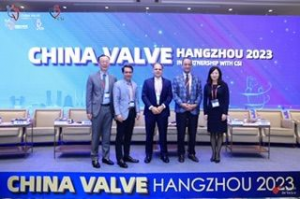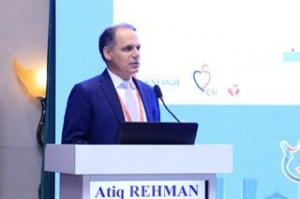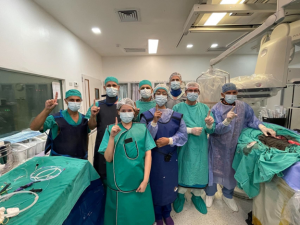Mastering Transcatheter Therapies: Dr. Atiq Rehman's Work and Achievements in the Field
CHILLICOTHE, OHIO, UNITED STATES, November 29, 2023 /EINPresswire.com/ -- Those seeking more about the rapidly advancing field of transcatheter therapies should look no further. This article will delve into the accomplishments of renowned cardiologist, researcher, and transcatheter expert Dr. Atiq Rehman, the Chief of Cardiothoracic Surgery at Adena Health. Through Dr. Rehman, the medical community can better understand the necessity of these therapies in enhancing patient outcomes and revolutionizing the world of cardiovascular treatment.
Who is Dr. Atiq Rehman?
Dr. Atiq Rehman is a highly regarded medical expert specializing in transcatheter therapies. Dr. Rehman has become a top professional with years of background and countless successful procedures. His devotion to patient care and staying at the forefront of medical technology have earned him a reputation as a respected and trusted physician. Dr. Atiq Rehman has significantly assisted the advancement of medical science and has positively influenced the lives of many patients. He is unique in transcatheter therapies and is renowned for his expertise and passion for his work.
What is Transcatheter Therapy?
Transcatheter therapy is a minimally invasive medical technique that is used to treat a mixture of heart illnesses. This innovative strategy involves accessing the heart through a small incision in the blood vessels, typically in the groin area. Specialized tools and devices, including catheters and stents, are then carefully guided to the heart through this incision.
For patients who may not be suitable for open-heart surgery, transcatheter therapy is often the preferred choice. It presents numerous advantages, such as a shorter recovery time, decreased risk of complications, and improved quality of life for those with heart diseases.
What are the Different Types of Transcatheter Therapies that Dr Rehman specializes in?
Transcatheter therapies consist of different minimally invasive techniques to treat different medical needs. These include:
Transcatheter aortic valve replacement (TAVR)
Mitra Clip insertion (TMVR)
Transcatheter mitral valve replacement (TMVI)
Transcatheter mitral valve in valve/valve in ring replacement
How Did Dr. Atiq Rehman Contribute to the Advancement of Transcatheter Therapies?
Dr. Atiq Rehman has significantly contributed to advancing transcatheter therapies through his groundbreaking work and innovations.
Developed novel techniques: Dr. Rehman pioneered new procedures and methods in this therapy, significantly improving patient outcomes and reducing risks.
Top 5 trainer/proctor for Edwards LifeSciences in 2021, as per CMS
Has been engaged with the industry as a consultant for Edwards LifeSciences, Medtronic, and Venus Medtech.
As a consultant for Venus Medtech, Dr. Rehman performed bench testing, US animal testing, and First in Human performed at Corrientes, Argentina
Dr. Rehman was Chief Medical Officer for start-up JVH-America and helped develop a new surgical aortic valve, “NEO”. He performed all bench testing and animal studies in the US. The valve is being marketed in Argentina and China, and the EU trial is starting soon.
In addition, he is helping develop two new valves with start-up Laguna Technologies. Dr. Rehman has also performed design modifications, bench testing, and animal testing for a new self-expanding Alpha Valve and balloon-expandable Zeta Valve.
Faculty at China Valve (largest Transcatheter Valve Conference in China) for the past 5 years.
First in Human implantation of Vitae valve at Corrientes Argentina
US Sites trained by Dr Rehman
First Transcatheter Mitral Valve in Ring simultaneously with TAVR
First Minimally invasive Pulmonary Artery Aneurysm Repair
First Minimally invasive repair of Pulmonary Valve
Dr. Rehman has been considered a trendsetter since the beginning. Thus, he performed an Endostent Graft repair of an Abdominal Aortic Aneurysm in a Nonagenarian (98yrs old ) in 2005
Youtube: https://youtu.be/SfGUaDc1-Ck?feature=shared
First TAVR in Pakistan:
Youtube: https://youtu.be/IJom8WCVfBM?feature=shared
First minimally invasive valve program in Pakistan:
Youtube: https://youtu.be/QMfptgx1-T8?feature=shared
Enhanced device design: He collaborated with engineers and manufacturers to develop innovative devices that have increased the efficacy and safety of the transcatheter method.
Published research: Dr. Rehman has published numerous research papers, sharing his findings and insights with the medical community and contributing to collective knowledge.
Dr. Rehman has more than 100 publications/oral presentations/poster presentations.
Dr. Rehman has been a reviewer for :
J of Interventional Cardiac Electrophysiology (JICE)
J of Cardiothoracic Surgery (JCTS)
British Medical Journal Case Reports (BMJ Case Reports)
J of American College of Surgeons (JACS)
J of Cardiac Surgery (JCS)
Training and education: He has devoted his time to exercising and enlightening other medical experts, communicating his expertise, and ensuring the widespread adoption of advanced procedures.
Dr. Rehman has been a Cardiovascular Surgeon for the past 20 years
He has performed more than 100 Abdominal and Thoracic Aortic Aneurysm Repairs
Dr. Rehman has extensive experience in Transcatheter Valve Therapy.
Dr. Rehman is a top 5 trainer/proctor for Edwards LifeSciences in 2021 as per CMS
Trained more than 200+ cardiac surgeons/cardiologists in some 100 US institutions for Transcatheter Valve Therapy.
Presentations and conferences: Dr. Rehman has participated in conferences and presentations, sharing his knowledge and advancements with a global audience, and fostering collaboration and invention.
What are the Benefits of Transcatheter Therapies?
Transcatheter therapies offer numerous advantages when compared to traditional surgical methods.
These include:
Minimally invasive: Transcatheter procedures only need small incisions, lowering the risk of difficulties, pain, and recovery time.
Lower risk: Due to their less invasive nature, these procedures significantly reduce the risk of infection, bleeding, and other difficulties.
Shorter hospital stays: Patients undergoing it typically have shorter hospital stays, allowing for a quicker return to normal activities.
Quicker recovery: The minimally invasive nature of these procedures often results in a faster recovery time than traditional surgery.
Less scarring: The small incisions used result in minimal scarring, improving cosmetic outcomes.
What is the Future of Transcatheter Therapies?
The future of transcatheter therapies is bright, thanks to technological advancements and strategies. These minimally invasive methods transform medicine by providing suitable alternatives to traditional open surgeries. Advantageous therapies like transcatheter aortic valve replacement (TAVR) and transcatheter mitral valve repair (TMVR) have shown great possibility in addressing different cardiovascular situations.
As research persists and technology evolves, society can expect further advancements in the safety, effectiveness, and accessibility of transcatheter therapies. Ultimately, this will aid patients by decreasing the risk of infection, hospital stays, and healing times. The future of transcatheter treatments presents the potential for enhanced patient outcomes.
What Innovations and Advancements Can Society Expect in the Field of Transcatheter Therapies?
As transcatheter therapies are continuously growing, medicine can expect several advancements.
Enhanced devices: New catheters and stents will be developed that offer improved precision and maneuverability during procedures.
Expanded applications: It will be utilized for various conditions beyond the heart, including treating structural defects in other organs.
Less invasive techniques: There will be a focus on developing even more minimally invasive procedures, reducing recovery time and improving patient comfort.
Personalized medicine: Progress in imaging and biomarkers will allow for tailored therapies based on individual patient characteristics.
Long-term outcome research: More studies will evaluate its long-term effectiveness and durability.
How Will Transcatheter Therapies Continue to Revolutionize Medical Treatments?
Transcatheter therapies will continue to revolutionize medical treatments by:
Advancing minimally invasive procedures: These therapies reduce the need for open surgery, minimizing patients' risks and recovery time.
Expanding treatment options: They allow for the treatment of complex conditions in patients who may not be suitable candidates for traditional surgery.
Improving patient outcomes: Precise targeting and delivery of treatments with transcatheter therapies reduce complications and improve overall patient outcomes.
Enhancing quality of life: Minimally invasive procedures mean shorter hospital stays, faster recovery, and less patient pain and discomfort.

Who is Dr. Atiq Rehman?
Dr. Atiq Rehman is a highly regarded medical expert specializing in transcatheter therapies. Dr. Rehman has become a top professional with years of background and countless successful procedures. His devotion to patient care and staying at the forefront of medical technology have earned him a reputation as a respected and trusted physician. Dr. Atiq Rehman has significantly assisted the advancement of medical science and has positively influenced the lives of many patients. He is unique in transcatheter therapies and is renowned for his expertise and passion for his work.
What is Transcatheter Therapy?
Transcatheter therapy is a minimally invasive medical technique that is used to treat a mixture of heart illnesses. This innovative strategy involves accessing the heart through a small incision in the blood vessels, typically in the groin area. Specialized tools and devices, including catheters and stents, are then carefully guided to the heart through this incision.
For patients who may not be suitable for open-heart surgery, transcatheter therapy is often the preferred choice. It presents numerous advantages, such as a shorter recovery time, decreased risk of complications, and improved quality of life for those with heart diseases.
What are the Different Types of Transcatheter Therapies that Dr Rehman specializes in?
Transcatheter therapies consist of different minimally invasive techniques to treat different medical needs. These include:
Transcatheter aortic valve replacement (TAVR)
Mitra Clip insertion (TMVR)
Transcatheter mitral valve replacement (TMVI)
Transcatheter mitral valve in valve/valve in ring replacement
How Did Dr. Atiq Rehman Contribute to the Advancement of Transcatheter Therapies?
Dr. Atiq Rehman has significantly contributed to advancing transcatheter therapies through his groundbreaking work and innovations.
Developed novel techniques: Dr. Rehman pioneered new procedures and methods in this therapy, significantly improving patient outcomes and reducing risks.
Top 5 trainer/proctor for Edwards LifeSciences in 2021, as per CMS
Has been engaged with the industry as a consultant for Edwards LifeSciences, Medtronic, and Venus Medtech.
As a consultant for Venus Medtech, Dr. Rehman performed bench testing, US animal testing, and First in Human performed at Corrientes, Argentina
Dr. Rehman was Chief Medical Officer for start-up JVH-America and helped develop a new surgical aortic valve, “NEO”. He performed all bench testing and animal studies in the US. The valve is being marketed in Argentina and China, and the EU trial is starting soon.
In addition, he is helping develop two new valves with start-up Laguna Technologies. Dr. Rehman has also performed design modifications, bench testing, and animal testing for a new self-expanding Alpha Valve and balloon-expandable Zeta Valve.
Faculty at China Valve (largest Transcatheter Valve Conference in China) for the past 5 years.
First in Human implantation of Vitae valve at Corrientes Argentina
US Sites trained by Dr Rehman
First Transcatheter Mitral Valve in Ring simultaneously with TAVR
First Minimally invasive Pulmonary Artery Aneurysm Repair
First Minimally invasive repair of Pulmonary Valve
Dr. Rehman has been considered a trendsetter since the beginning. Thus, he performed an Endostent Graft repair of an Abdominal Aortic Aneurysm in a Nonagenarian (98yrs old ) in 2005
Youtube: https://youtu.be/SfGUaDc1-Ck?feature=shared
First TAVR in Pakistan:
Youtube: https://youtu.be/IJom8WCVfBM?feature=shared
First minimally invasive valve program in Pakistan:
Youtube: https://youtu.be/QMfptgx1-T8?feature=shared
Enhanced device design: He collaborated with engineers and manufacturers to develop innovative devices that have increased the efficacy and safety of the transcatheter method.
Published research: Dr. Rehman has published numerous research papers, sharing his findings and insights with the medical community and contributing to collective knowledge.
Dr. Rehman has more than 100 publications/oral presentations/poster presentations.
Dr. Rehman has been a reviewer for :
J of Interventional Cardiac Electrophysiology (JICE)
J of Cardiothoracic Surgery (JCTS)
British Medical Journal Case Reports (BMJ Case Reports)
J of American College of Surgeons (JACS)
J of Cardiac Surgery (JCS)
Training and education: He has devoted his time to exercising and enlightening other medical experts, communicating his expertise, and ensuring the widespread adoption of advanced procedures.
Dr. Rehman has been a Cardiovascular Surgeon for the past 20 years
He has performed more than 100 Abdominal and Thoracic Aortic Aneurysm Repairs
Dr. Rehman has extensive experience in Transcatheter Valve Therapy.
Dr. Rehman is a top 5 trainer/proctor for Edwards LifeSciences in 2021 as per CMS
Trained more than 200+ cardiac surgeons/cardiologists in some 100 US institutions for Transcatheter Valve Therapy.
Presentations and conferences: Dr. Rehman has participated in conferences and presentations, sharing his knowledge and advancements with a global audience, and fostering collaboration and invention.
What are the Benefits of Transcatheter Therapies?
Transcatheter therapies offer numerous advantages when compared to traditional surgical methods.
These include:
Minimally invasive: Transcatheter procedures only need small incisions, lowering the risk of difficulties, pain, and recovery time.
Lower risk: Due to their less invasive nature, these procedures significantly reduce the risk of infection, bleeding, and other difficulties.
Shorter hospital stays: Patients undergoing it typically have shorter hospital stays, allowing for a quicker return to normal activities.
Quicker recovery: The minimally invasive nature of these procedures often results in a faster recovery time than traditional surgery.
Less scarring: The small incisions used result in minimal scarring, improving cosmetic outcomes.
What is the Future of Transcatheter Therapies?
The future of transcatheter therapies is bright, thanks to technological advancements and strategies. These minimally invasive methods transform medicine by providing suitable alternatives to traditional open surgeries. Advantageous therapies like transcatheter aortic valve replacement (TAVR) and transcatheter mitral valve repair (TMVR) have shown great possibility in addressing different cardiovascular situations.
As research persists and technology evolves, society can expect further advancements in the safety, effectiveness, and accessibility of transcatheter therapies. Ultimately, this will aid patients by decreasing the risk of infection, hospital stays, and healing times. The future of transcatheter treatments presents the potential for enhanced patient outcomes.
What Innovations and Advancements Can Society Expect in the Field of Transcatheter Therapies?
As transcatheter therapies are continuously growing, medicine can expect several advancements.
Enhanced devices: New catheters and stents will be developed that offer improved precision and maneuverability during procedures.
Expanded applications: It will be utilized for various conditions beyond the heart, including treating structural defects in other organs.
Less invasive techniques: There will be a focus on developing even more minimally invasive procedures, reducing recovery time and improving patient comfort.
Personalized medicine: Progress in imaging and biomarkers will allow for tailored therapies based on individual patient characteristics.
Long-term outcome research: More studies will evaluate its long-term effectiveness and durability.
How Will Transcatheter Therapies Continue to Revolutionize Medical Treatments?
Transcatheter therapies will continue to revolutionize medical treatments by:
Advancing minimally invasive procedures: These therapies reduce the need for open surgery, minimizing patients' risks and recovery time.
Expanding treatment options: They allow for the treatment of complex conditions in patients who may not be suitable candidates for traditional surgery.
Improving patient outcomes: Precise targeting and delivery of treatments with transcatheter therapies reduce complications and improve overall patient outcomes.
Enhancing quality of life: Minimally invasive procedures mean shorter hospital stays, faster recovery, and less patient pain and discomfort.
Dr. Atiq Rehman
Dr. Atiq Rehman
email us here
Visit us on social media:
LinkedIn
Legal Disclaimer:
EIN Presswire provides this news content "as is" without warranty of any kind. We do not accept any responsibility or liability for the accuracy, content, images, videos, licenses, completeness, legality, or reliability of the information contained in this article. If you have any complaints or copyright issues related to this article, kindly contact the author above.





